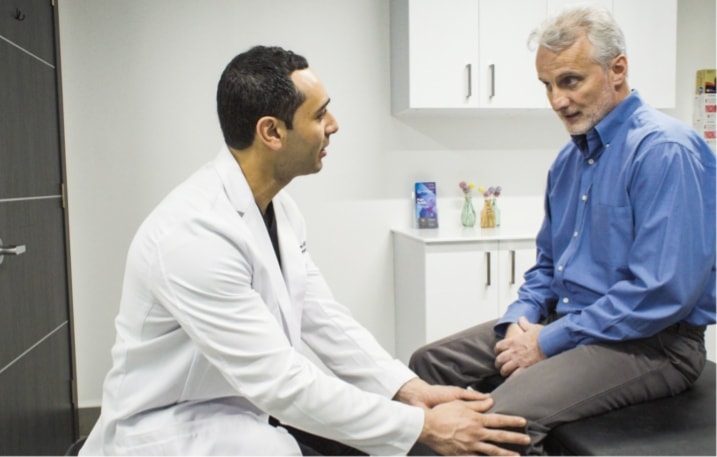What Does Knee Tendonitis Feel Like? A Harvard Trained Knee Pain Doctor Responds
October 20, 2022
Knee tendonitis is certainly not on anyone’s wish list! What does knee tendonitis feel like? The unlucky recipients of this condition are gifted with inner knee pain when straightening the leg, pain above the kneecap, sharp pain under the kneecap, and weakness and instability while standing. No one wishes for knee tendonitis because it is such a major (and painful) inconvenience. Many people delay finding help for their knee pain because they’re afraid that surgery will be their only option. However, knee tendonitis is easily treated with conservative treatments that also provide long-lasting knee pain relief.

Meet with the knee pain specialists at Pain Treatment Specialists and learn how our team of Harvard-trained knee pain doctors treat conditions such as jumper’s knee, knee tendonitis, and patellar tendonitis. Our interventional pain doctors do not use surgery as a treatment for knee pain unless it is medically necessary. When you book an appointment at one of our pain clinics in NYC, northern NJ, and Long Island you’re taking the first steps to receiving sound medical advice about your knee pain.

What Does Knee Tendonitis Feel Like?
Tendonitis is a knee injury that occurs due to overuse. For example, if you play a sport that requires a lot of jumping like basketball, you’re at a greater risk for developing tendonitis. The formal name for this condition is patellar tendonitis. Your patellar tendon connects your kneecap to your shinbone, and undergoes a lot of stress with repeated jumping. It also helps your knee fully extend so you are able to kick, run, and jump. When this tendon becomes inflamed, it causes a tremendous amount of knee pain.
What does knee tendonitis feel like? For most people, this most common symptom is knee pain. The pain typically occurs in the area where your kneecap attaches to your shinbone, which is also known as your tibia. Some patients describe it as a knee injury that hurts to straighten, pain above the kneecap, or sharp pain under the kneecap. These manifestations of knee pain make your daily activities like walking, running, or jumping incredibly painful. You may even feel intense weakness or instability in your knee when you jump or walk.
When you’re ready to get rid of knee tendonitis symptoms, contact Pain Treatment Specialists. During your consultation at one of our state-of-the-art pain clinics, you’ll meet with our sympathetic and knowledgeable knee pain doctors who utilize the best treatments for knee tendonitis.
When Should I Seek Medical Advice for Knee Injuries?
When your knee pain is connected to a repetitive motion like running, cycling, or jumping, your patellar tendon is inflamed. While you should seek medical care, it is not an immediate need in comparison to more serious knee injuries. If you fall and hear a tearing noise, you may have a torn patella or patellar tendon tear. This type of serious knee injury may be treated by cutting-edge pain medicines like platelet-rich plasma therapy, you may need surgical repair. If you feel intense pain after a fall or accident, it’s best to visit an emergency clinic to rule out a serious injury.
Knee tendonitis, which is also known as jumper’s knee, is a chronic knee pain condition. This means that you may feel more pain after working out or repeatedly bending your knee. People who have jobs that require a lot of repetitive movements such as carpenters or construction workers are also at a greater risk for knee tendonitis. Jumper’s knee is a progressive condition, and if it doesn’t improve after resting from physical activity should be addressed by a pain management specialist.
This is why it’s critical to schedule an appointment with Pain Treatment Specialists. Our Harvard-trained knee pain doctors understand how knee pain interferes with your daily activities, and are ready to find an effective solution for your knee tendonitis.
What Helps Tendonitis in the Knee?
Knee tendonitis can easily be helped by pain medicine treatments, as well as at-home treatments. Pain Treatment Specialists offer the following treatments at their pain clinics:
- Steroid Injections: This targeted corticosteroid treatment dramatically reduces pain and swelling in your knee. Its anti-inflammatory properties are much more powerful than over-the-counter pain medicines, and are delivered via injection directly to your knee. Since it is a minimally-invasive procedure, you’ll be back on your feet the same day.
- Platelet-Rich Plasma Therapy: PRP therapy is a cutting-edge treatment that uses your own blood to promote healing. Your blood’s platelets possess tremendous healing properties, and are separated through a centrifuge. Then, this platelet-rich blood is injected at the injured site, where it promotes growth and healing.
In addition to these treatments offered at our pain clinics, you can also try a few at-home treatments to relieve knee tendonitis pain. Our knee pain doctors recommend avoiding activities that aggravate your knee pain until the pain and swelling subside. Also, be mindful to stretch before more vigorous activities, and use over-the-counter medicines as necessary to reduce your pain. You can also ice your knee to reduce swelling, and elevate it while sitting.
Schedule an appointment at Pain Treatment Specialists and begin feeling relief from your chronic knee pain. No one wants to know what knee tendonitis feels like, but if you are experiencing this pain please know that there is long-lasting relief at our cutting-edge pain clinics.
Book a Consultation
Scheduling a consultation with one of our pain treatment specialists is one of the best ways to determine the proper solution for pain relief.














